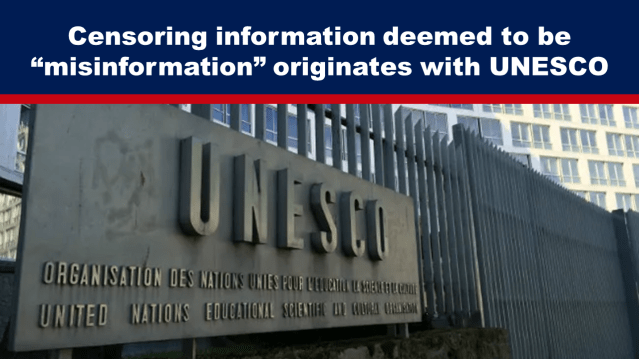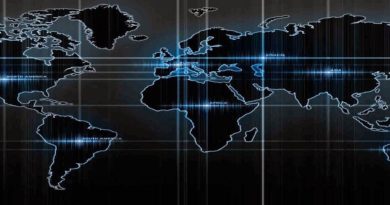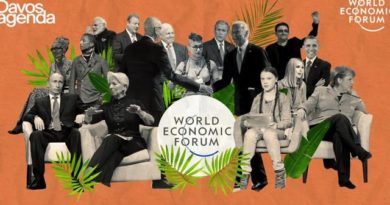Censoring information deemed to be “misinformation” originates with UNESCO
When the World Economic Forum called “misinformation” the single largest identified risk in early 2024, it was the latest call of many, with an express, not-so-carefully-hidden objective.
The idea of censorship in the name of “misinformation” began with the United Nations in 1945, specifically with the United Nations Educational, Scientific and Cultural Organisation (“UNESCO”).
The following is a tweet posted by Escape Key describing the history of the use of “misinformation” as a tool of censorship to which we have added hyperlinks.
Let’s not lose touch…Your Government and Big Tech are actively trying to censor the information reported by The Exposé to serve their own needs. Subscribe now to make sure you receive the latest uncensored news in your inbox…
Censoring Free Speech
By Escape Key
It seems strange that we, in the West, have to put up with even dealing with this question, given that our entire framework fundamentally rests upon a cornerstone of free speech. Yet, here we are.
But where did this drive come from?
And in that regard – yes, a number of recent initiatives exist, including those outlined by [Michael] Shellenberger. But they don’t step back in time to identify the roots – which incidentally is where these issues will have to be addressed. Or else the issue will just come right back when you least expect it, in much the same way those dandelions on your neighbours’ lawn arrive on yours.
In reality, the call for censorship is a two-pronged drive; while one is the public drive we see at the likes of Davos, there’s a hidden drive the fruits of which we also very much experienced during the scamdemic. And this drive led to doctors and other health industry professionals being fired for refusing to carry out orders.
But first, it’s important to understand a little bit of background, and this story starts in London, 1945. Predictably, this is about the United Nations, specifically, UNESCO. Because almost as soon as the ink was dry on the agreement which founded UNESCO itself, they turned around and signed an agreement with ICSU [International Council for Science], which in more ways than one was the “S” in UNESCO.
The overall scheme was set for the long term. Consequently, what better organisation to infiltrate but the one responsible for producing the “best available science,” ICSU, and educating the young? And this partnership worked wonderfully for many years, leading to progressive brainwashing to the point where a majority of people now believe plant food is a pollutant. And naturally, ICSU, their committees (i.e., SCOPE ), and many of their scientists were generously funded by … wait, I don’t want to spoil the surprise.
In 1989, at the request of Collegium International founding Michel Rocard, the French National Consultative Ethics Committee for Health and Life Science delivered opinions on “ethics in science.” These opinions went through still a conference in still-communist Moscow in 1991, becoming ‘Bioethics and Human Rights’. In 1995, Clinton established the National Bioethics Advisory Committee, just 3 years before the first successful culturing of human stem cells in a lab. And in 1996, the ICSU created their ‘Standing Committee on Responsibility and Ethics of Science’, a panel comprising of almost entirely “soft” scientists disregarding the claimed “hard” science background of the ICSU. And this then kicked UNESCO into gear, first launching COMEST in 1998, and then to release their publication, ‘Science, ethics, and responsibility‘, in 2000.
But COMEST was different in scope – while ICSU’s SCRES focused on scientists and science in general, COMEST also included the delivery of science to the people in general. External communication. And what also took place in May 1998 was the Clinton administration dealing the “escalating threat posed by information warfare, information terrorism, and cybercrime.” On this point Russia more than agreed; in October of that same year, they penned the UN General Assembly resolution A/C.1/53/L.17 outlining the “misuse or exploitation of information resources or technologies for criminal or terrorist purposes.”
So, at this stage, we have the ICSU SCRES dealing with internal matters within the fields of science, and UNESCO COMEST – with some level of overlap – dealing with communication of “the best available science” to the public at large – external matters. But to make further progress, what was needed was a disaster. An event so large, you’d be marked the fool for even daring to question it.
9/11. Or more specifically, the anthrax attacks.
In March 2002, the Eubios Declaration for International Bioethics arrived. This was then followed by calls for “ethics declarations” in the various STEM fields, eventually leading to even preposterous, contemporary calls for “ethics in mathematics,” having shoved through declarations in practically all other fields. The objective of those ethics declarations, of course, is to create a parallellegal justice system, where you can get fired by an undemocratically selected “ethics panel” for daring to question any aspect of fraud. The scamdemic was a clear example of that, as healthcare professionals en masse were dismissed for “ethics violations.” This will also soon take place in the field of “Climate Change,” as related “ethics declarations” were discussed in the Eubios Journal of Asian and International Bioethics already in May 2009 (EJAIB Vol 19/3), also making a note of the “health implications of climate change.” And in that same year, COMEST prepared the report titled ‘Ethics and Climate Change‘.
The public still presented an issue, however. So, the work of the Clinton administration and Russia on “information terrorism” gradually turned into claims of “dangerous misinformation,” and eventually became overt calls for “restrictions” on free speech, including for the sake of “public health and morals” in the 2009 document ‘Camden Principles on Freedom of Expression and Equality‘, ultimately calling for an ombudsman on the topic. This work was then carried forward by the ‘Rabat Declaration‘ of 2013, released by the United Nations Human Rights Council (A/HRC/22/17/Add.4).
However, what the Camden Principles also outlined was the “right to be forgotten,” and in 2010, France introduced legislation on exactly that. And these led to Dan Shefet in 2013 suing Google, forcing them to globally remove information, after which he launched the Association for Accountability and Internet Democracy, who would go on to cooperate with UNESCO in 2018 on their conference in Canada titled ‘Internet and the Radicalisation of Youth‘, from which the ‘Call of Quebec‘ was launched, outlining the implementation of “measures for preventing radicalisation.” Meanwhile, another United Nations agency – the ITU [International Telecommunication Union] – with UNESCO involvement launched the Broadband Commission, which in 2017 started work on “protecting children online,” along with calling for “media literacy education.” This led to two reports, the latter of which was titled ‘Balancing Act: Countering Digital Disinformation While Respecting Freedom of Expression‘. And this document outlined the idea of “developing responses that reduce or remove visibility.” This naturally relates to “fact-checked” social media posts, and could also be described as “free speech but not reach.”
The idea of an “internet ombudsman” continuously resurfaced in documents, and in August 2020, in cooperation with UNESCO, the Hyderabad Declaration was released, titled ‘Access to Information in a time of crisis’, where said crisis obviously referred to covid-19. The document calls for “the moral balancing” of free speech, and helpfully suggests a centralisation of information while respecting “the right to be forgotten.” It carries on, outlining the difference between mis- and disinformation being intent, which obviously is impossible to determine with any level of certainty. A point also made clear through the release of “UN2.0,” which goes on to state conflicting definitions of disinformation on a singular page.
But we’ve skipped a bit of history. Because while the Broadband Commission was busy, determining how to most efficiently silence you in the future, the Annenberg Public Policy Centre put together a ‘Transatlantic Working Group on Content Moderation Online and Freedom of Expression‘, a group including not only a wealth of WEF members, but also UK Tory MP Damian Collins, Michael Chertoff, Thomas Hendrik Ilves, and David Kaye. I left him for last because he on Twitter would later outline his definition of free speech which includes “respect of the rights or reputations of others,” though said principles clearly didn’t apply to himself, as he on the same day in the most juvenile manner possible would address Elon Musk’s “grade school version of free speech; quisling in the face of government demands, Soros-baiting antisemitism, 2nd amendment extremism.” Incidentally, Kaye is a member of the Council on Foreign Relations, and in the years 2014-2020 worked as a Special Rapporteur on Freedom of Expression and Opinion … for the United Nations.
Damian Collins would then go to work, pushing for censorship in the UK Parliament, having previously pushed every imaginable bug-eyed conspiracy about especially Russia. Another member of the Transatlantic Working Group was Barbora Bukovská, who just by amazing coincidence also helped draft the Camden Principles in 2009.
I’m now going to spoil the surprise, which isn’t really one. Because, as per usual, the Rockefeller Foundation funded not only the ICSU, SCOPE, and many of their scientists, but they also – through the Spelman fund in the early 1930s – funded the International Institute of Administrative Sciences, an organisation strongly connected to Guy Braibant, an openly self-declared communist. And why is that important? Because it was he, who chaired that 1989 French National Consultative Ethics Committee which produced the first outline on ethics in science.
On 1 January 2020, the HK[S] Misinformation Review launched. The first edition outlined misinformation, disinformation, anti-vaccination, an indirect plea for censorship, and they further questioned what constitutes “ethical research.” This initiative can be traced back to a workshop at Harvard, which also included Renee DeResta and Sander van der Linden. This was then followed by a 5 Jan article by ABC News titled ‘5 ways to spot disinformation on your social media feeds‘ [the article was taken down and an article with the same title was republished on 29 May] and in late January, the Washington Post announced that ‘Facebook, Google and Twitter scramble to stop misinformation about coronavirus’, at a time where the gross levels of genuine disinformation hadn’t truly been ramped up by the likes of the WHO and the MSM.
Of course, the UK has recently passed legislation pushing censorship, and the European Union’s Digital Services Act is by intent crumbling the very foundation of Western Democracy through the rest of the continent, leaving really only America still standing.
Don’t allow it to happen over there.
God Bless America.

This article has been archived for your research. The original version from The Exposé can be found here.



